News
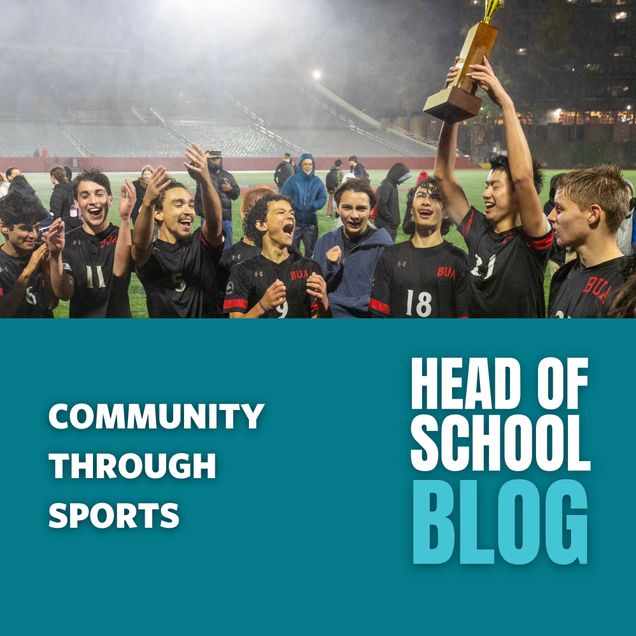
Community through Sports
Our soccer and cross country teams are wrapping up strong seasons this week. Congratulations to all of our student athletes and coaches. Special kudos to our boys varsity soccer team for bringing home the league championship in a great game yesterday evening at Nickerson Field. It was, as they say, a dark and stormy night. Goal kicks traveled either 10 or 50 yards depending on the direction of the wind. Routine shots became dangerous for goalkeepers as the ball skidded over the soaked turf. The boys kept their focus and pulled off a great win.
I was struck by the number of fans who showed up in the monsoon. Parents arrived in the stands with umbrellas, long coats, and hot cider. Students came too – finding spaces on the sidelines and under eaves of a nearby building. It was a festive atmosphere, despite the weather. This was just a week after Fall Fest – BUA’s homecoming celebration – where students, teachers, parents, and alums came out in large numbers to cheer on our girls and boys soccer teams under the lights at the stadium. The sidelines were crowded with students holding signs cheering on their classmates. And there was no rain.
Sports do a lot of good things for individuals. They help young people build lifelong habits of physical activity; give students a rare chance to fail and learn from that experience; allow them to feel what it’s like to be on a team and rely on one another; and provide a way to see the impact of steady, diligent work toward a goal. For the community, it does something else. It brings us together. And I’m really grateful for that.
Basketball and fencing seasons are just around the corner. See you on the sidelines!
BUA Boys Soccer Clinches League Championship
The BUA boys soccer team won their second MBIL championship in three years last night after defeating BISB 3-2. The boys worked hard all season, going undefeated in the league, and finished the year with a dominant performance in the final. Goals from Konrad Richter '28, Sebastian Millet-Woo '29, and Ned Jeffries '26 ensured a deserved victory for the team. Congratulations to all the players and coaches on another incredible season! Photos from the championship game are available here.
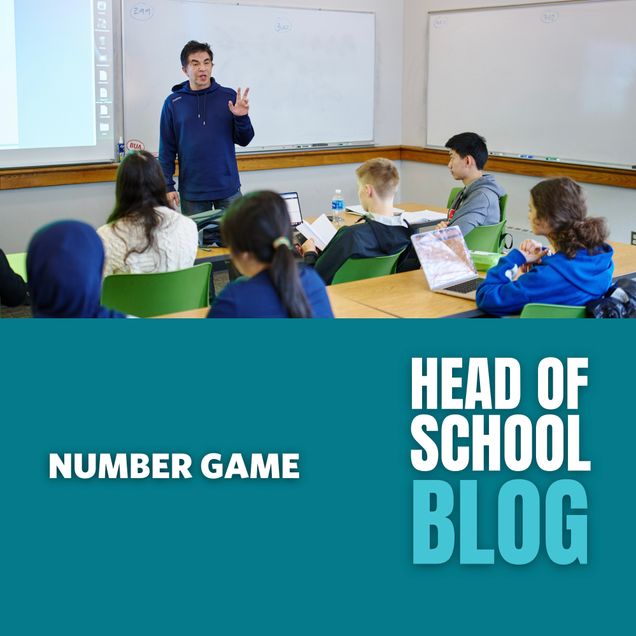
Number Games
I start every weekday driving my 5-year-old son to school. He loves math, and on the way to kindergarten he’ll often ask if we can play a “number game” – little word problems with some silliness thrown in (if you had seven strawberry-frosted donuts and each of your sisters takes three when you aren’t looking . . . .). He loves it because it’s challenging, because it’s a puzzle, because it’s play, and because it’s something we get to do together. I hope he always feels that way.
I visited a calculus 2 class here at BUA yesterday, and I was so heartened to see the same spark in these kids. I observed this group of about a dozen 10th to 12th graders for twenty minutes, and the whole time they were working on a single problem in small groups. The teacher shared with me that the problem was both conceptually tricky and algebraically diabolical. Kids were huddled together trying to untangle the knots the problem offered. The room was boisterous – comic groans when they hit roadblocks, celebrations when they worked something through. Now and then, a student from one group would get up and walk over to another to compare notes. The teacher was walking around giving pointers – not answers. At one point he said, “I have heard four answers so far, and no two are the same!” The kids laughed and kept at it. I talked to one of those students in the hallway today and asked if they figured it out. She beamed when she told me that they did.
It breaks my heart that as kids get older, so many of them lose that playfulness and joy in math, which is too often replaced by either grudging acceptance or even a fixed-mindset phobia: “I’m just not good at math.” We owe them better. Our teachers work hard to create environments where we can play with math – providing real challenge alongside loving support. I’m so glad this is a place where kids still get to play “number games.”
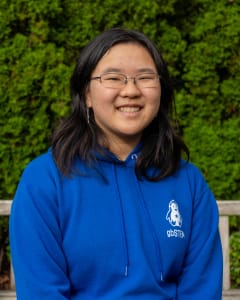
Alumna Kendree Chen ’25 Honored as US Presidential Scholar
 BUA alumna Kendree Chen '25 was named a 2025 US Presidential Scholar -- one of only 161 students nationwide to be honored with this award, and one of only three in Massachusetts. The 2025 awardees were announced in a press release from US Secretary of Education Linda McMahon on September 26. The US Presidential Scholar program "recognizes high school seniors for their accomplishments in academics, the arts, and career and technical education fields." A complete list of the 2025 Presidential Scholars is available here.
BUA alumna Kendree Chen '25 was named a 2025 US Presidential Scholar -- one of only 161 students nationwide to be honored with this award, and one of only three in Massachusetts. The 2025 awardees were announced in a press release from US Secretary of Education Linda McMahon on September 26. The US Presidential Scholar program "recognizes high school seniors for their accomplishments in academics, the arts, and career and technical education fields." A complete list of the 2025 Presidential Scholars is available here.
Of the 3.9 million students that graduated from high school this year, only 161 qualified for the 2025 award based on their "extraordinary performance in their high school career...outstanding performance on the SAT or ACT exam, or nominations made by chief state school officers and partner recognition organizations," according to the US Department of Education press release. Following the nomination process, candidates go through a rigorous application process including submitting essays, transcripts, and school evaluations for review. Final selections are made by the White House Commission on Presidential Scholars.
The US Presidential Scholars Program was established in 1964, by executive order of the President, to recognize and honor some of the nation’s most distinguished graduating high school seniors. In 1979, the program was extended to recognize students who demonstrate exceptional talent in the visual, creative and performing arts. In 2015, the program was again extended to recognize students who demonstrate ability and accomplishment in career and technical education fields. Each year, up to 161 students are named as Presidential Scholars, one of the nation’s highest honors for high school students.
During her time at BUA, Kendree played a leadership role in numerous clubs and activities including the Lobstah Bots (BUA's robotics team), Vox Caeli, and many more. Kendree wrote her Senior Thesis on "A Community-Based Program Model for Engagement of Underserved Students in STEM," and also contributed to a joint thesis project called "Poseidon-Bot: A Streamlined Document Parsing RAG Model." Kendree also serves as the president of gbSTEM (Greater Boston STEM), a non-profit delivering "free introductory computer science, math, engineering, and science enrichment to elementary and middle school students." She is currently in her first year at MIT and is passionate about software development, STEM education, and robotic controls.
BUA congratulates Kendree on this well-earned recognition!
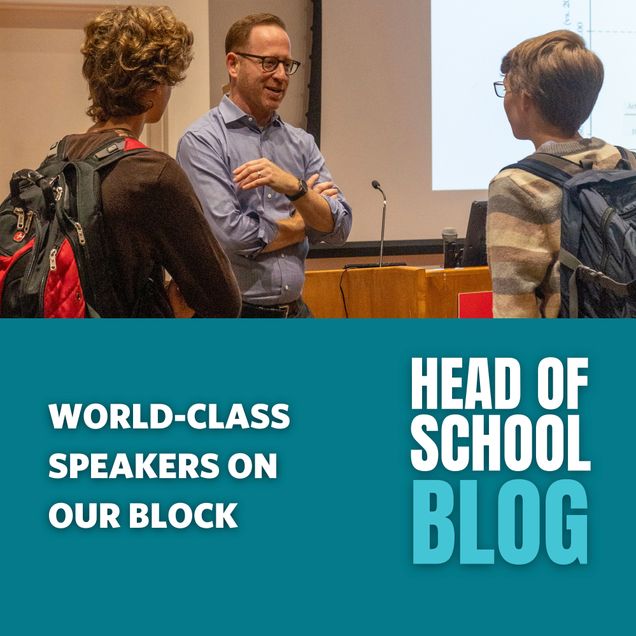
World-Class Speakers on our Block
At this week’s all-school meeting, our community heard from Dr. Joshua Goodman, a professor at BU’s Wheelock College of Education & Human Development. Dr. Goodman studies economics and education policy, working with large data sets to analyze education-related questions. He shared his recent research – which you may have read about in the news – on trends in public school enrollment in the aftermath of the pandemic. The talk was fascinating; he walked us all through his data analysis, the conclusions, and the limitations of the study.
My favorite part was the question-and-answer period. For 15 minutes, our students asked sophisticated, thoughtful questions about the findings, bringing to bear both their personal experiences as young people educated during the pandemic and their critical thinking skills. It could have gone on much longer. Over the next several days, I received wonderful feedback about Dr. Goodman’s talk from faculty and students alike. One student shared how nice it was that he pitched it at a college or graduate-school level, not talking down to this crowd. Another described how interesting it was to explore a quantitative analysis of something that feels so relevant and connected to his personal experience. A third felt inspired to explore adjacent topics for her senior thesis. Dr. Goodman will be returning to BUA later this month for an opt-in lunch with students interested in talking more. I imagine there will be a crowd!
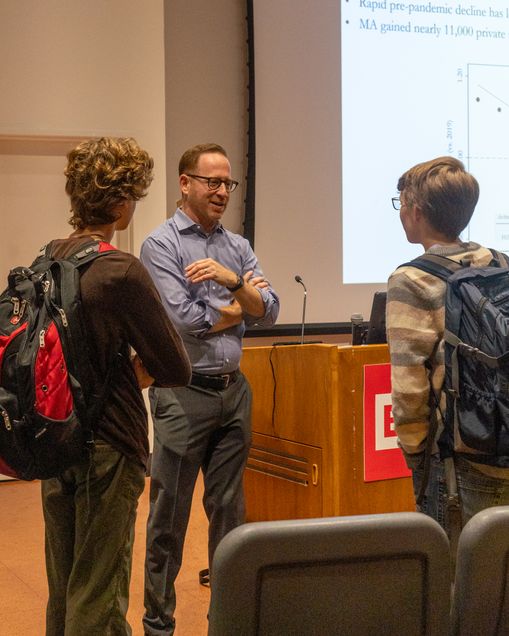
The talk, and the community’s reception, reminded me of how fortunate we are to have the special connection to BU. Beyond the hundreds of BU classes our students take each year and the dozens of professors who advise student senior theses, we are able to bring in remarkable speakers like Dr. Goodman; later in the year, we’ll hear from two leading BU professors on applications of AI in their respective fields. Our tenth-grade seminars feature opportunities for students to work with BU’s school of business, maker space, innovation center, and software engineering group. Students seek out opportunities in BU labs, leverage the archives for research, use the fitness and recreation center, and more. I’m glad to be able to open those doors for these kind and curious young people and grateful for the partnership with the University.
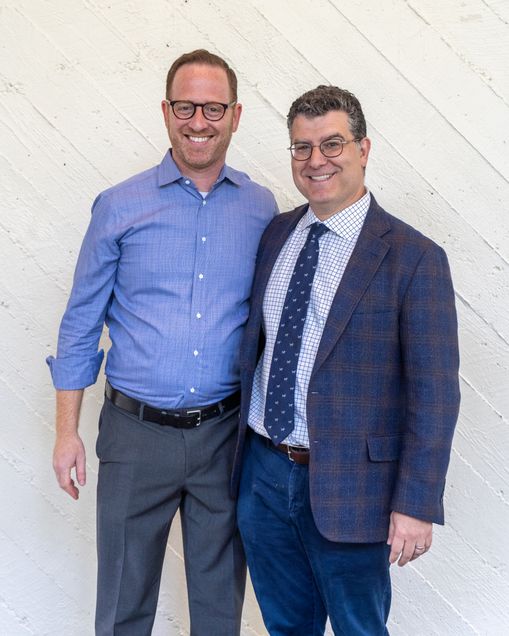
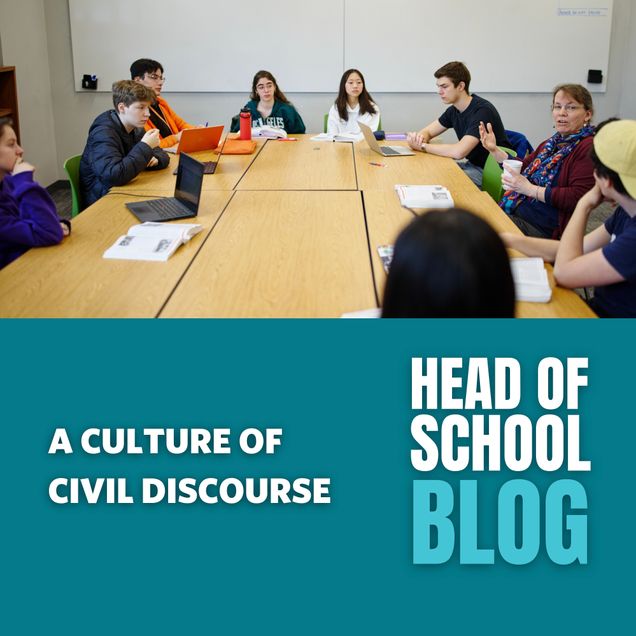
A Culture of Civil Discourse
Fostering productive, respectful civil discourse has always been a strength of this school and one of our most sacred obligations. Our mission promises that students will be challenged to “think critically” and “engage meaningfully in our community and beyond.” Schools have to be places where students can learn how to speak up with conviction, disagree with respect, listen with an open heart, and foreground our common humanity. Where else can they? In a polarized, influencer-focused, social-media-dominated age, spaces for that kind of exchange are disappearing, and the social risks of engagement can feel stifling.
Last fall, I opened the term with a talk exploring this idea, recognizing the challenges, and offering some hope that BUA can be an oasis. The tradition here of open, healthy, and informed back-and-forth in our classroom gives me confidence. We also continue to put in place intentional programming to foster productive dialogue in spaces outside the safety of the curriculum. Conversations@BUA, a teacher-curated space for students, faculty, and staff to meet together to discuss controversial topics every several weeks, will begin again next week with a Friday-afternoon discussion about free speech under the cloud of political violence. This year, several students have formed a current events club to provide even more structured opportunities for learning together and pushing one another’s thinking. The faculty and staff are learning too. Several of us did some training with the Close Up Foundation earlier this year, and we have planned a few internal professional development sessions to sharpen our skills around charged conversations in class. BUA is also in the early stages of organizing a civil discourse conference for students and faculty across Boston-area independent schools for later this year.
In the interest of making sure our school’s voice does not chill individual voices in the community, we clarified the school’s position about institutional statements in response to national and world events. The statement speaks for itself and has, so far, served us well.
I welcome your thoughts, suggestions, and disagreement.
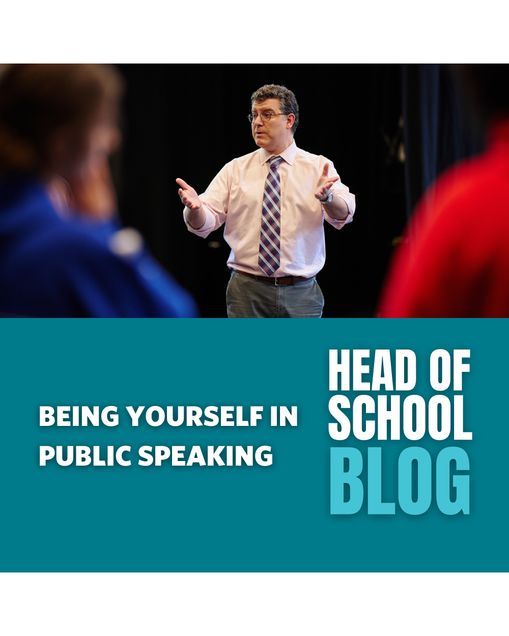
Being Yourself in Public Speaking
I teach a public speaking seminar to all of our 9th graders. The classes are relatively small, since we’ve divided up the group into trimester cohorts. It’s a fun way for me to get to know our new students and for them to get some practice with an important set of skills.
But something else is happening too. The first assignment is for each student to prepare and deliver a 3-minute personal narrative – an experience that they learned something from or that helped shape them in some way. Ninth graders in this fall cohort are understandably just getting to know one another, figuring out who their friends are, and finding their place at the school. Given that, it’s been striking that so many of the students have shared stories that are deeply personal and have allowed themselves to be vulnerable: the experience of feeling isolated and invisible; overcoming a long-standing fear; being forgiven for a transgression; dealing with family relocation and separation from friends. I’m proud of these students who shared so openly up at the podium. I’m grateful for the warm and supportive reception from their peers in the audience. And I’m thrilled about what this says about the culture and community these kids are fostering with one another.
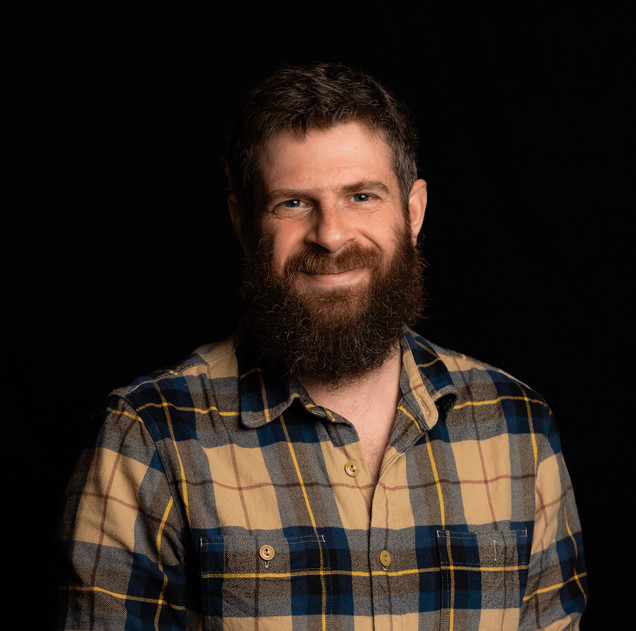
BUA Honors Dan Bear ’06 with the 2025-2026 Distinguished Alumni Award
 BUA is delighted to present the 2025-2026 Distinguished Alumni Award to Dan Bear '06 for his pioneering work at the intersection of AI and immunotherapy.
BUA is delighted to present the 2025-2026 Distinguished Alumni Award to Dan Bear '06 for his pioneering work at the intersection of AI and immunotherapy.
This annual award, launched in 2022, goes to an alumnus/a who best exemplifies the values of BUA and has used those qualities to make an impact on the community and world around them. Recipients are nominated and selected by the BUA Alumni Council.
Dan Bear graduated from BUA in 2006, and went on to receive his BA in cellular and molecular biology and his PhD in neuroscience, both from Harvard. He completed a postdoc at Stanford. Dan is currently Director of AI Research at NOETIK, an AI-native biotech company harnessing self-supervised learning to discover better precision immunotherapies. He’s also founder and CEO of a stealth SSL startup. Dan has been described as “a genius who has made a significant impact on AI research while remaining humble.”
We are grateful to Dan for his ongoing commitment to BUA. Keep your eyes peeled for the Fall 2025 edition of Odyssey, the magazine of Boston University Academy, which includes a Q&A with Dan on his work and career trajectory.
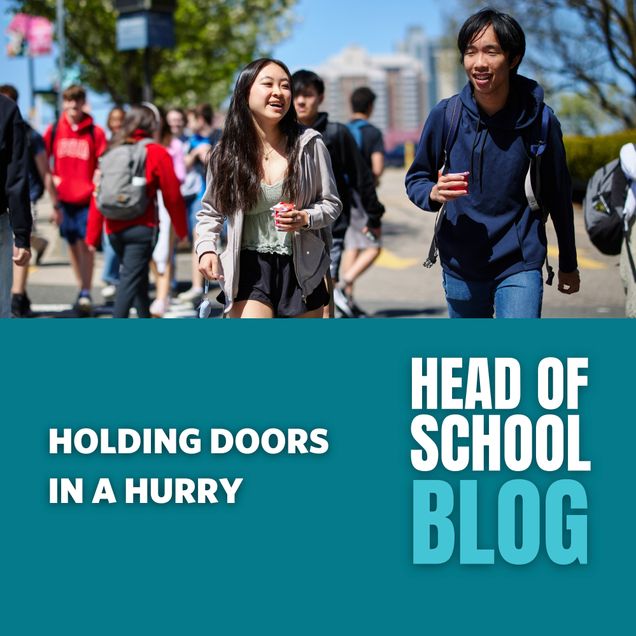
Holding Doors in a Hurry
Yesterday morning, I stood outside the school’s entrance – like I do most days – greeting students as they arrived. At 8:29, I saw a student standing alone across the street dutifully waiting for the walk signal at the crosswalk. When the signal changed, she rushed across the street, presumably eager to get to her 8:30 class. We walked into the building together, and, despite her rush, she took the time to hold the door for me as we entered the lobby. She then raced to the staircase and stopped on the first step, noticing another student approaching the side door. She pivoted and opened the door for that student before continuing on her way.
Holding a door is a kindness. When repeated, it becomes habit. Habits in turn build character. We celebrate moments like these because we embrace our duty to help students build character in this critical developmental period. Becoming a person for others is both a benefit to society and a source of life-long fulfillment for that individual.
Yesterday’s example, though, doesn’t feel like the student was just building character; to me, it revealed this student’s character. It is easy to be generous with your time in a relaxed setting. Holding a door when you are already late says something about who you are. I’m so grateful to be in a school with young people like this one who stand as models for all of us.
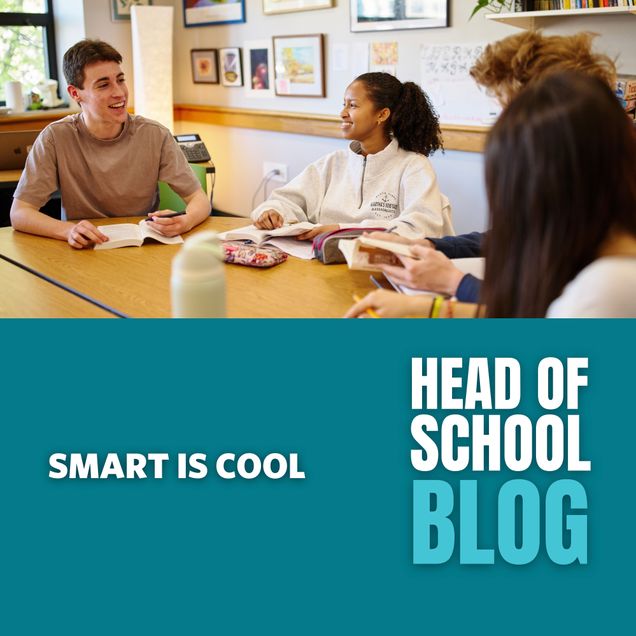
Smart is Cool
Every August, I meet with the family of each new student by Zoom. I ask about the parents’ stories, their child’s path, and their hopes and concerns about their child’s BUA experience. One parent shared something I hear from quite a few new families: they really wanted for their child to be in a place where engaging in class conversation, asking questions, and being interested in learning is the norm – a place where being smart is cool. The parent worried that in the past few years of their child’s education in middle school, the culture had shifted; there was less room for those questions and a growing sense of social risk from jumping in too eagerly into class discussion. There were even early signs of their child beginning to disengage.
I’ve been walking the halls as classes get into swing, and I happened to walk by this student’s English class. I lingered in the doorway for a few minutes. I wish the parent could have seen what I saw. Their child was on the edge of their seat, novel open and annotated. In the few minutes I was there, the student spoke several times in an easy back and forth with several other students. At one point, I caught a big smile. As I walked away, I was smiling too.